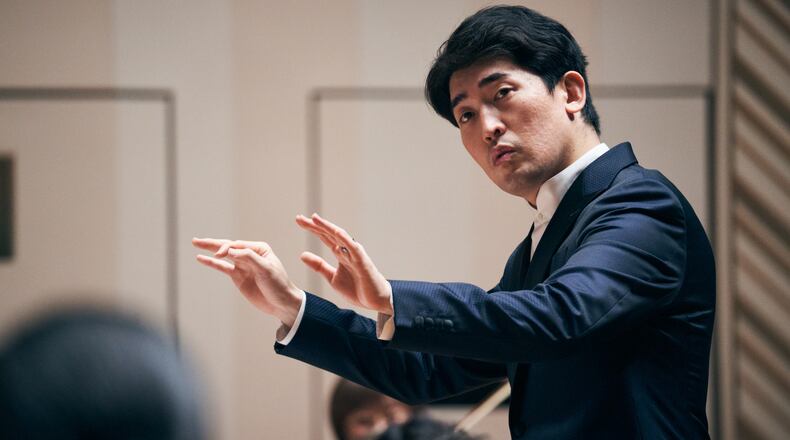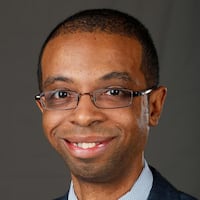“Naturally, (Harada) brought an impressive sense of artistic vision, an extensive and distinguished record of international experience as a conductor, a deep commitment to opera, ballet and symphonic repertoire, and, of course, (he) electrified audiences through (his) prodigious abilities as conductor,” Nugent said.
Credit: Josh Ohms JOSH OHMS PHOTOGRAPHY
Credit: Josh Ohms JOSH OHMS PHOTOGRAPHY
Nugent also said Harada’s “passion for community and a keen sense of the business of the arts” bolsters his appeal.
“Like those who led the DPO before (him), (Harada) understood what it means to be truly dedicated to the community, rooted in the community and, fundamentally, of service to the community.”
The 39-year-old Harada, born in Tokyo, Japan, will become the fifth music director in the orchestra’s 92-year history, preceded by founder Paul Katz (1933–1975), Charles Wendelken-Wilson (1975–1987), Isaiah Jackson (1987–1995), and Neal Gittleman (1995–present). Harada will begin his tenure during the 2024–2025 season as music and artistic director designate. He’ll officially assume the role of music and artistic director on July 1, 2025. He committed to a five-year term with the option to renew.
Highlighting Harada
Harada is a recipient of the prestigious 2023 Sir Georg Solti Conducting Award. He currently serves as music and artistic director of the Savannah Philharmonic in Savannah, Georgia, a position he’s held since the 2020-21 season.
In addition to his American posts, Harada also acts as permanent conductor of the Tokyo Symphony Orchestra and is the principal guest conductor and artistic partner of the Aichi Chamber Orchestra in Japan. He previously served as associate conductor for four years at the Cincinnati Symphony and Pops, where he regularly assisted Music Director Louis Langrée and collaborated with James Conlon and Juanjo Mena at the orchestra’s annual May Festival.
Credit: MASATOSHI YAMASHINO
Credit: MASATOSHI YAMASHINO
Harada’s engagements as a guest conductor include appearances with the symphony orchestras of Cincinnati, Houston, Seattle, Indianapolis, Fort Worth, NHK, Yomiuri Nippon, and Osaka, as well as with the philharmonic orchestras of Osaka, Kanagawa, Nagoya, Japan, New Japan and Tokyo. He’s also conducted with the Nikikai Opera, Cincinnati Opera, Arizona Opera and the North Carolina Opera.
Harada is a six-time recipient of The Solti Foundation U.S. Career Assistance Award, and in 2013, he was invited to the Bruno Walter National Conductor Preview. He studied with Lorin Maazel at Castleton Festival and Fabio Luisi at the Pacific Music Festival, where, at Valery Gergiev’s invitation, he served on the festival’s faculty in 2016, 2018, and 2021.
Promising choice
DPAA organizers said Harada was the top candidate among nearly 250 applicants from around the globe, according to Arts Consulting Group. ACG screened applicants through a rigorous process that yielded a preliminary round of 57 candidates. After conducting initial interviews, ACG presented 27 candidates to the DPAA Search Committee for consideration. The applicant pool represented 40 states and 26 countries and included a substantial number of candidates who self-identified as BIPOC and/or LGBTQIA+.
“I feel certain that our Dayton community will heartily welcome and embrace Harada and his family, as will all the musicians, ballet dancers, opera performers, subscribers, future subscribers, donors, and young musicians,” said DPAA Search Committee Chair Barbara O’Hara in a press statement. “To me, a fitting description of Harada is that of a Renaissance man. His background is so varied covering classical music, opera, and ballet as well as contemporary and pops. His rapport with the musicians is outstanding — he challenges them and is respectfully demanding of them. While in Dayton, one of his great desires is to become an involved partner with other performing arts organizations.”
Future planning
Stressing the importance of creativity, Harada hopes to inspire audiences to support the performing arts in new ways.
“I want to create experiences which DPAA can only do in Dayton, entertainment which all of Dayton would not want to miss,” Harada said. “I want to create a reason for someone to attend live performing arts instead of just scrolling on their phone for 15 minutes. That 15 minutes could become the most memorable experience of the first time at a ‘Nutcracker,’ seeing a ‘Tosca’ or experiencing the journey through a Carl Nielsen symphony.”
He also noted the forward-looking significance of ensuring young people have access to the performing arts.
“It is vital that we curate the most innovative and high quality art form for our younger generation,” Harada said. “Arts organizations are good at putting an unnecessary wall between arts and the community. Of course it’s not the intention, but we often forget how to make our art form relevant. And diversity, equity and inclusion is not solved by using a photo of a child of color holding an instrument on the front page of a brochure. That’s not how it’s done.”
Credit: Russell Florence
Credit: Russell Florence
Harada succeeds Neal Gittleman, who announced his intent to retire in May of 2022. Gittleman looks forward to the organization evolving under Harada’s supervision.
“It’s obvious from the beautiful, thrilling concert they performed last month that Keitaro Harada and the Dayton Philharmonic have exactly the kind of simpatico that every city wishes for their orchestra and their conductor,” Gittleman said. “So as I’ve done for the past 29 years, I will continue to expect great and greater things from our Dayton Philharmonic just from a different spot in the concert hall. And together we will all enjoy the exhilarating journey that Keitaro and the musicians will take us on.”
You can learn more about Harada at kharada.com. For additional information, visit daytonperformingarts.com.
About the Author





